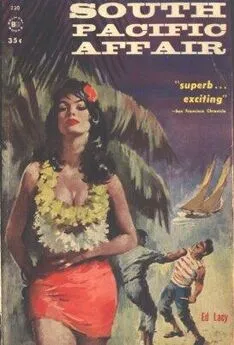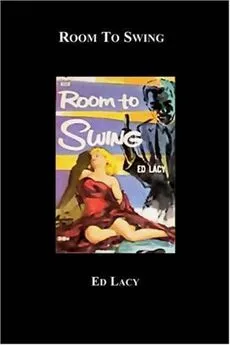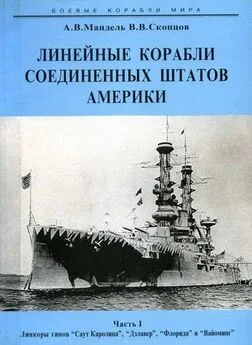Ed Lacy - South Pacific Affair
- Название:South Pacific Affair
- Автор:
- Жанр:
- Издательство:неизвестно
- Год:неизвестен
- ISBN:нет данных
- Рейтинг:
- Избранное:Добавить в избранное
-
Отзывы:
-
Ваша оценка:
Ed Lacy - South Pacific Affair краткое содержание
South Pacific Affair - читать онлайн бесплатно полную версию (весь текст целиком)
Интервал:
Закладка:
I was dry and put on my shorts, went back to the wheel where Nancy was playing checkers with Eddie. The old woman gave her daughter a little hug and slipped me a big smile. There was something too pat about Nancy's approach to me—as though she had me tight in the son-in-law bag— which annoyed me.
Eddie told me to steer at right angles to a group of clouds on the horizon and I checked this on the compass, to find something I could call a course.
Eddie and Mrs. Adams went on with their checker game. Each square on the worn board had a hole and each checker a nail driven through it—so it would stay put in the wind. I wasn't much of a checker fan, but sometimes Eddie and I would go on a spree, play for several days, and then not use the board for months. The same with the torn deck of cards we had.
Ruita said she wanted to get a book out of her bag, stopping on the lower cabin steps—out of sight of the others —to blow a kiss at me.
A breeze came up and for awhile everything was quiet, except for the washing sound the Hooker made whenever she dipped into a wave trough. Mrs. Adams beat Eddie, as usual, then went over and sat by Ruita, neither of them speaking. Ruita was deep in her book but the old woman stared at me, weighing me with her eyes; evidently she found it all pleasing to her. I felt like a butterfly pinned under a glass and for a wild moment wondered if Ruita wasn't in on the “plot” too— although that didn't make any sense, because if she merely wanted a man or a husband she could have her pick.
Eddie pointed up at several black frigate birds wheeling overhead, said, “We must be near the bigger atolls. Ugly birds.”
“Young ones make good eating,” Nancy said. “Taste like chicken. Did you know these atolls were first sighted by a Portuguese explorer named...” The blank look swept over her old face. Ruita said quickly, “Momma, you sound as if there weren't people living on the Tuamotus until Quiros saw them.”
“Louise, you know I didn't mean it that way.” Nancy turned to me. “Do you like the atolls, Ray?”
“Guess so. And birds.” I nodded at the frigate birds soaring in the blue sky. “Isn't it something—the feeling of freedom they give? Free to go anyplace they wish?” It was pretty cornball, but the old lady got it; her eyes turned very solemn.
Chapter V
Eddie awoke me before dawn, to take the wheel. We were in an area full of reefs and he climbed up the mast, calling down directions—masthead piloting till we were clear of the reefs. After breakfast I turned in for a nap while Ruita and her mother were busy sewing a dress they were going to give the bride.
Late in the afternoon Eddie called out, “There's Forliga, smack ahead of us.”
Eddie's accurate, instrument-less navigation fractured me, as usual. We all looked past his pointing finger and didn't see a thing. Eddie said, “See that bright spot in the sky on the horizon? That's Forliga. The bright spot is the sunlight reflected from the lagoon.”
Within two hours we began to close in on the atoll, which then looked like a low cloud... and soon we could make out the mist where the sea pounded the reef, then the tops of palm trees, and before sundown we were at the channel in the reef and a flock of canoes came out to greet us. I started the motor.
Some fifteen islanders leaped aboard the Hooker, tied their canoes to our stern for a tow. They all seemed to know Ruita and Nancy, welcomed them warmly with much handshaking and hugging. There were several young women in the group and of course Eddie, as usual, had his eye open for any girl he could latch onto.
After Nancy and Ruita, Eddie was the center of attraction, first explaining about his face, then showing off his muscular control, making one of his heavy shoulder muscles jump, nearly dance up and down his chest.
There was one islander who was almost as muscular as Eddie, but younger and taller, with long strong legs. He kept hugging and kissing Ruita and she kept her arms around him. I found myself getting steamed. Then she introduced him to me, saying, “This it Titi. He is the bridegroom.”
I wished him luck in French and he answered in Tahitian, thanking me, saying it had been many months since he had seen his beloved sister—and squeezed Ruita.
“Titi is your brother?” I asked her.
“Half-brother. He is my mother's son.”
Titi didn't look much over nineteen and when I asked Nancy if he was her son, it sent Ruita and the old lady into giggles. This was translated for Titi's benefit, and he doubled up with laughter.
Finally Nancy told me: “You don't understand. I am not Titi's mother but he is the son of Louise's mother. You see, I am Louise's mama faa-amu —the mother who gives to eat. I am her adopted mother.”
I said, “Oh,” and grinned stupidly. That meant Ruita was a full-blooded islander, which didn't mean a thing to me; and it also meant she didn't have the old lady's syph, which had been a tiny worry way back in my mind.
A stocky man in a new white T-shirt and old pants, who had been busy examining our rigging, now came over and hugged Nancy and then shook my hand, said he was Cumber, Chief of Forliga, and welcomed me to the atoll.
Actually Forliga was a number of small islets, one large atoll and one smaller one, all of it shaped like a rough horseshoe and surrounded by a reef. The lagoon was about fifteen miles long and nearly five miles wide, dotted with islets and coral heads. The highest land didn't seem more than eight feet above sea level, and neither of the two 'big' atolls were over five hundred yards wide. There were two villages, clusters of huts on the atoll, and we were heading toward the larger and main village.
More canoes joined us as we tied up to a dock made of jagged hunks of coral. Nancy and Ruita were swept ashore in a crowd of laughing men, women, and kids. They went over to Titi's house and Eddie and I stayed on the cutter: I cleaned up the motor, aired the bilge for gas fumes, while Eddie politely asked an old man about copra and was assured that within a few days, after the wedding feast, enough would be made to fill our hold. Eddie asked if there had been many marriages lately and found the usual shortage of women. He told me, voice glum, “Goddamn, I won't have a chance. This old man says there are bachelors on the atoll looking for gals to marry.”
Followed by a gang of laughing kids we finally reached Titi's large hut where we met his bride, a small and very cute young girl, who seemed to be four or five months pregnant—a fact which amused many of the islanders, although not the outhouse type of smirking it would cause back in the States. Many women patted her bulging stomach and congratulated the would-be bride and groom. Titi said that although it was his first child, he was sure when the pregnancy started and in a matter-of-fact voice described in detail violent love-making they had done “right after I returned from the diving season—that very night.”
After meeting the bride we were introduced to the entire population—some two hundred and thirty-two people—and I shook hands with all of them like a politician.
It was decided to have the wedding before nightfall. It seemed everything was in readiness, and had been for many days, awaiting our arrival. Everybody immediately pedaled away on their bikes and soon returned with cleaned pigs, fish, taro and all sorts of fruits and vegetables. A huge fire was started in a sand pit to heat the cooking stones.
At one end of the short village 'street' was a tiny church, complete with a small spire, all of it made of coral blocks so bleached and whitewashed it hurt your eyes. Somebody was ringing the bell in the steeple like crazy, and the frantic bell-ringing seemed to keep time for the frenzy of activity we saw all about us.
Women were busy burning coconut fiber husks to make charcoal for their irons. Many people had already bathed in the lagoon and changed into their Sunday clothes: the men in berets and badly fitting suits, the women in clean starched white dresses and broad hats. For the wedding feast they had bought out the Chinese storekeeper's entire stock of canned goods—on credit against the next diving season. A kind of deacon of the church and two catechists would perform the ceremony, which was really more of a singing festival than a marriage service. When the regular priest made his yearly visit to the atoll, he would “legally” marry Titi and his bride, and all other couples who had “married” since his last visit. But after tonight, Cumber the Chief would officially enter Titi's marriage in his records.
We had to dress for the wedding so Ruita took my arm and we ran back to the boat, sprinting like a couple of fools, to get her bags. She seemed very excited and the excitement had reached me too. We found Eddie handing out samples of our stomach medicine to a group of men who gravely said it was very fine and wanted to add several bottles to the punch, which the bride's father and brothers were mixing in four ten-gallon tins. The punch consisted of vanilla pods for taste, bottles of rum and hair oil and a little water. Other tins of coconut and orange beer had been brewing for days, so the entire atoll was set to tie on a good one.
I got Ruita's bags, and her mother's, and we took them up to the guest hut. Once inside Ruita kissed me, whispered, “Sometime in the morning, when we have finished sleeping off the meal, you and I are going away.”
“Where?”
“To a place where we will be alone—as you wish. I have arranged all things. Now hurry and dress, it is getting dark and the services will start soon so—”
Some old duck burst into the hut and gave Ruita a bear hug, including a gentle slap on her behind. Then he eagerly shook my hand and told me in Tahitian how happy he was to see me and I must see his “popaa machine” at once.
Ruita said, “This one is a sort of uncle of mine. A rarity in the islands—he is a miser. He even still has some bird money.”
“What's that?”
“You know nothing about the islands,” she said, teasing me. “Everything I must explain to you—except making love; that you do well on your own, Bird money is from the old days when the whalers used Chilean silver dollars. These have a big eagle on the face, so they were called bird money. But now they have disappeared.”
“They have not disappeared for me,” the old man said, “I do not spend my money foolishly. Also, they are quite beautiful for their own sake, if rubbed well with a soft cloth. I have the best motor in all the islands and this too shines like coins when rubbed. It cost me many thousand taras. I must show you to it, it is a motor for the outside of a boat. Unhappily it no longer works and therefore I hope you may be able to repair it.”
I said I would be happy to see it and Ruita told me in English, “Look at his motor now or he will be hurt, but do it quickly. Then dress your best.”
I followed the old joker to his hut, and there I found a gleaming twenty horsepower outboard motor on an aluminum rack. “This is mine,” the man said proudly, as if showing off a jewel. “It cost many taras and is it not a thing of much beauty?”
I told him it was as beautiful as a sunset. A tara is a Polynesian dollar and equal to five Tahitian francs. This outboard probably sold for around three hundred dollars in the States, and at least a grand to this old man after he paid the various shipping charges. I said in my best Tahitian, “I am sure this makes a canoe travel with the speed of a shark.”
“Like the fastest fish it went on water—but only once. Then it does not work, although I give it clean petrol. Can you repair it?”
Читать дальшеИнтервал:
Закладка:










